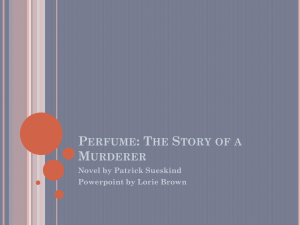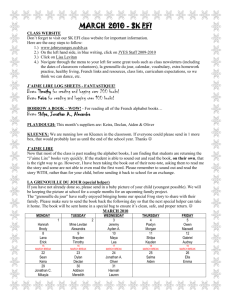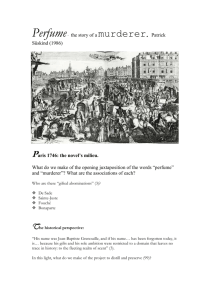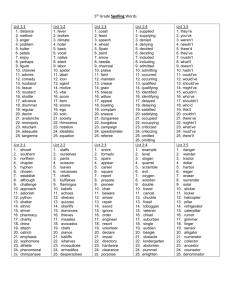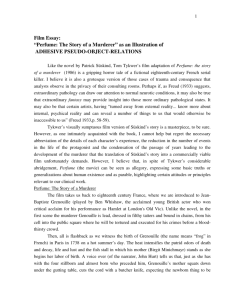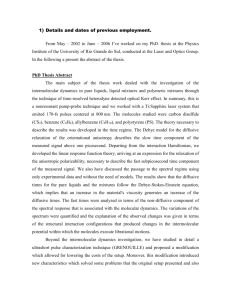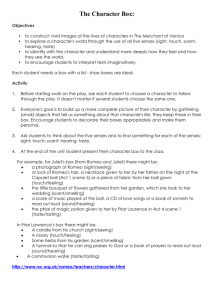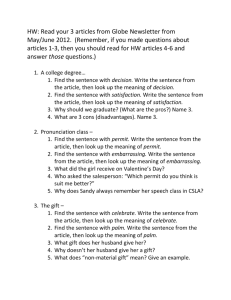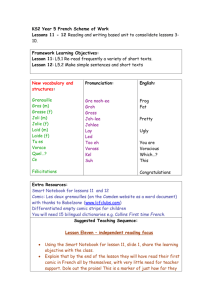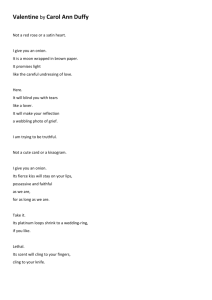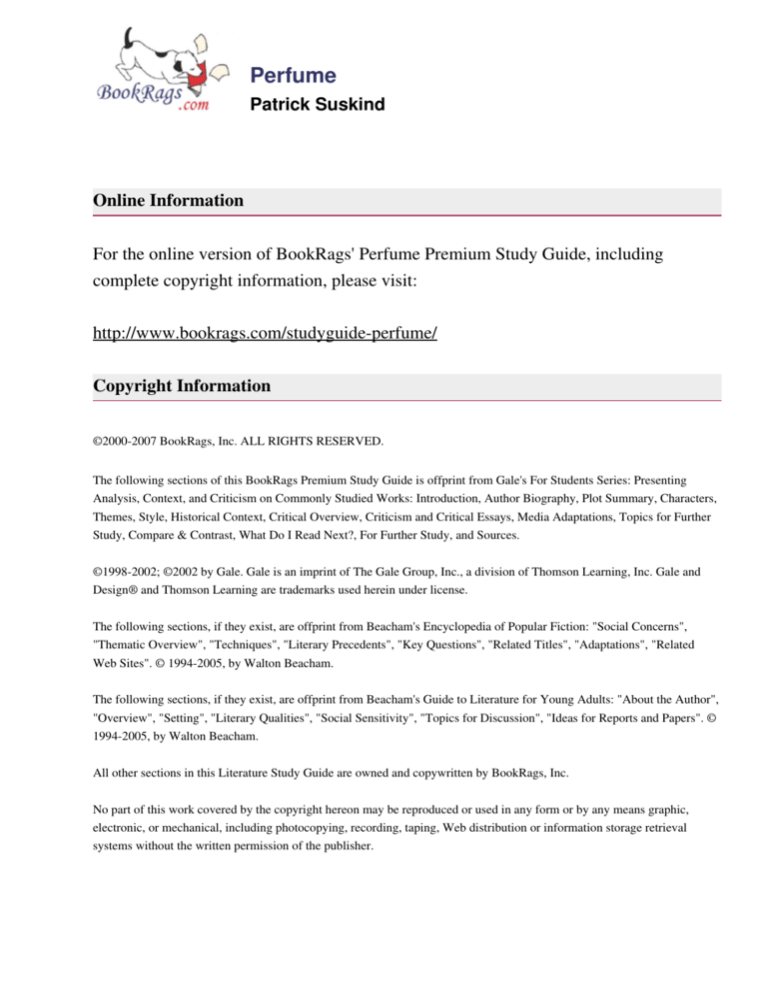
Perfume
Patrick Suskind
Online Information
For the online version of BookRags' Perfume Premium Study Guide, including
complete copyright information, please visit:
http://www.bookrags.com/studyguide-perfume/
Copyright Information
©2000-2007 BookRags, Inc. ALL RIGHTS RESERVED.
The following sections of this BookRags Premium Study Guide is offprint from Gale's For Students Series: Presenting
Analysis, Context, and Criticism on Commonly Studied Works: Introduction, Author Biography, Plot Summary, Characters,
Themes, Style, Historical Context, Critical Overview, Criticism and Critical Essays, Media Adaptations, Topics for Further
Study, Compare & Contrast, What Do I Read Next?, For Further Study, and Sources.
©1998-2002; ©2002 by Gale. Gale is an imprint of The Gale Group, Inc., a division of Thomson Learning, Inc. Gale and
Design® and Thomson Learning are trademarks used herein under license.
The following sections, if they exist, are offprint from Beacham's Encyclopedia of Popular Fiction: "Social Concerns",
"Thematic Overview", "Techniques", "Literary Precedents", "Key Questions", "Related Titles", "Adaptations", "Related
Web Sites". © 1994-2005, by Walton Beacham.
The following sections, if they exist, are offprint from Beacham's Guide to Literature for Young Adults: "About the Author",
"Overview", "Setting", "Literary Qualities", "Social Sensitivity", "Topics for Discussion", "Ideas for Reports and Papers". ©
1994-2005, by Walton Beacham.
All other sections in this Literature Study Guide are owned and copywritten by BookRags, Inc.
No part of this work covered by the copyright hereon may be reproduced or used in any form or by any means graphic,
electronic, or mechanical, including photocopying, recording, taping, Web distribution or information storage retrieval
systems without the written permission of the publisher.
Table of Contents
Plot Summary................................................................................................................1
Characters......................................................................................................................5
Jean-Baptiste Grenouille.......................................................................................5
Antoine Richis......................................................................................................5
Giuseppe Baldini..................................................................................................6
Marquis de La Taillade-Espinasse........................................................................7
Madame Gaillard..................................................................................................7
Druot.....................................................................................................................7
Madame Arnulfi....................................................................................................8
Chenier..................................................................................................................8
Grimal...................................................................................................................8
Jeanne Bussie........................................................................................................8
Father Terrier........................................................................................................9
Papon....................................................................................................................9
Laure Richis..........................................................................................................9
Grenouille's Mother..............................................................................................9
The Redheaded Girl..............................................................................................9
Pelissier...............................................................................................................10
The Cannibals.....................................................................................................10
Objects/Places..............................................................................................................11
Paris....................................................................................................................11
Grasse.................................................................................................................11
The Cimetiere des Innocents..............................................................................11
The Cave.............................................................................................................11
Pont-du-Change..................................................................................................11
Notre-Dame Cathedral........................................................................................12
River Seine..........................................................................................................12
i
Table of Contents
Objects/Places
Rue des Marais...................................................................................................12
Amor and Psyche................................................................................................12
Nuit Napolitaine..................................................................................................12
Grenouille's Perfume..........................................................................................12
La Napoule..........................................................................................................13
Massif Central.....................................................................................................13
Social Concerns...........................................................................................................14
Techniques...................................................................................................................15
Themes.........................................................................................................................17
The Nature of Love.............................................................................................17
The Power of Scent.............................................................................................18
The Ambiguity of Morality................................................................................19
Significant Topics........................................................................................................20
Style..............................................................................................................................21
Point of View......................................................................................................21
Setting.................................................................................................................21
Language and Meaning.......................................................................................22
Structure..............................................................................................................23
Quotes...........................................................................................................................25
ii
Table of Contents
Key Questions..............................................................................................................29
Topics for Discussion..................................................................................................30
Literary Precedents.....................................................................................................31
Related Titles...............................................................................................................33
Copyright Information...............................................................................................34
iii
Plot Summary
Perfume is the story of Jean-Baptiste Grenouille, a man born into eighteenth-century
France with a superhuman sense of smell, but with no personal odor of his own. He is
orphaned at birth, and grows up without love to become a cold and calculating
murderer. He is motivated in his crime by a desire to possess the scent of a young
woman named Laure Richis, which he intends to steal using the extraction methods he
has learned as a journeyman perfumer. From this girl's scent, he creates the most
powerful perfume in the world, which has the effect of making anyone who smells it
fall in love with the wearer. Grenouille uses the perfume to escape punishment for the
murders he has committed, even gaining forgiveness from Laure Richis' father. He is
not satisfied, however, for he still has no genuine scent of his own. In a bizarre
suicidal ending to the novel, Grenouille wanders into a camp of vagrants and douses
himself with his powerful scent. In a fit of passion, the vagrants attack and eat him.
Grenouille is born in a fish stall and left among the guts on the ground to die by his
mother. She is eventually executed for letting four previous children die, and
Grenouille is taken in by the church. The monk in charge of him has trouble finding a
wet nurse to feed him, however, because he is a ravenous eater and because he has no
smell. He is sent to live with a woman who takes in orphans, Madame Gaillard.
As Grenouille grows up under the harsh but fair hand of Gaillard, he realizes he has an
ability that nobody else has, which is a superhuman sense of smell. He is able to detect
the slightest odor from across the city, and can use scent the way others use vision to
perceive objects. Yet he has no individual scent of his own, something that makes him
practically invisible to others, who do not realize that they use their sense of smell to
detect the presence of other people.
Madame Gaillard sends Grenouille to work for a tanner named Grimal. He slaves
away for years for Grimal, doing the worst of chores, biding his time until an
opportunity comes along. He is gradually given more and more freedom by Grimal,
Plot Summary
1
which he uses to explore the scents of the city. One night during a fireworks display,
he smells a scent so lovely that he is compelled to follow it. It comes from a young
woman who is sitting alone in a courtyard. Grenouille comes from behind her and
strangles her, taking in her scent as she dies. He creeps away and is not caught.
Opportunity turns up when he is asked to deliver a load of skins to Giuseppe Baldini, a
master perfumer. Grenouille maneuvers his way inside Baldini's workshop and talks
him into letting him create a perfume for him from the ingredients in his shop.
Grenouille has by this time memorized thousands of scents, and has a desire to create
new ones by learning the perfumer's art. Baldini is skeptical, but indulges Grenouille.
Grenouille astounds Baldini by creating a perfume that is overwhelmingly beautiful.
He takes Grenouille on as an assistant, and exploits his amazing ability to become a
rich and famous perfumer. He teaches Grenouille what he can about extracting the
scent from natural materials, but Grenouille wants to learn more. Baldini eventually
grants Grenouille his journeyman perfumer papers and lets him go, provided he never
tell that he was the secret of Baldini's success.
Grenouille sets out for Grasse, the center of the scent-making trade, to learn more
about the craft. Once outside the city, however, he begins to avoid the smell of
humans, and eventually finds himself on a desolate mountaintop with no trace of
human scent. Here he becomes a hermit, living in a dark cave for seven years, during
which time he lives in his imagination populated by all the smells he has ever
encountered. The most wonderful of these is the scent of the young girl he murdered.
Then suddenly he has the realization for the first time that he himself has no smell. He
panics and leaves the cave. He decides he must create a scent for himself and makes
off toward Grasse. On his way, he is taken in by a nobleman, Taillade-Espinasse, who
rehabilitates Grenouille and gives him some money. He steals away from
Taillade-Espinasse and makes his way to Grasse.
Arriving in Grasse, Grenouille once again encounters a smell like the one of the girl he
murdered in Paris. He follows the scent to the mansion of a scent wholesaler named
Plot Summary
2
Richis. It is Richis's daughter that Grenouille can smell, and he begins to devise a plan
to possess her scent for himself. He takes a job in a perfumer's workshop and begins to
learn more about the methods of extracting scent from things. He begins to experiment
with robbing the scent of living beings such as small animals. After some success, he
begins to carry out his plan.
The town becomes terrified as several young girls turn up murdered, naked, and with
their hair cut off. The killer cannot be found. It is Grenouille killing the girls. He
wraps them in oil-soaked linen as they die and extracts their scent. This scent he
concentrates into an intense oil he keeps hidden in small bottles in his cabin. The town
of Grasse is desperate to stop the killings. One day the killings just stop. After six
months, they have largely forgotten about them.
There is one person who has not forgotten the murders, however, and that is Richis.
He has decided that he has some insight to the motive of the killer and believes,
correctly, that his own daughter is the ultimate target. He packs up his household and
pretends to leave for the town of Grenoble. On the way, he and his daughter break
away and head toward the sea. He intends to have her married to the son of a baron
right away. Once she has lost her virginity, he reasons, the killer will no longer desire
her.
Grenouille is able to track them with his nose, however. While they are stopped at an
inn, he climbs into Laure's window and kills her, taking her scent as he has done with
the other girls. He gets away and returns to Grasse.
He is soon caught, as he had been seen at the inn. He confesses to the murders and is
sentenced to be executed. On the day of the executions, however, he steps out of the
carriage that is carrying him to the scaffold, wearing the ultimate perfume that he has
created from the scents of his murder victims. At once the crowd is convinced that he
must be innocent. The scent makes them feel they are in love with him, and that he
must be set free. Even Richis falls into tears, begging Grenouille to forgive him.
Meanwhile, the amassed crowd descend into a gigantic sexual orgy.
Plot Summary
3
Grenouille passes out. He is overcome once again by the panic that he has no scent of
his own. He wakes up in Richis's mansion, in Laure's very bed. Richis asks him to be
his adopted son, he loves him so much. Grenouille agrees, but as soon as possible he
leaves the mansion and sets of out of Grasse toward Paris, with a bottle of his ultimate
perfume.
He is going to Paris to die. He can make people love him with his perfume, but it will
only ever be a hollow love because he has no scent of his own. He enters Paris and
goes back to the neighborhood where he was born, near a foul-smelling cemetery.
There, a group of vagrants have built a small fire and are gathered around it.
Grenouille steps into the circle of vagrants and douses himself with the ultimate
perfume. The vagrants are overcome with love and desire for Grenouille, to the point
that they attack and eat him.
Plot Summary
4
Characters
Jean-Baptiste Grenouille
The main character of the novel. Grenouille is orphaned as an infant and raised in
strict conditions by a woman named Madame Gaillard, who takes in orphans. He is a
small man, ugly, and with a crippled foot. He possesses a superhuman sense of smell,
which he can use as other people use sight to perceive objects and other people. He
does not give off any scent himself, however, which makes him nearly invisible to
others. He grows up without any sense of right and wrong, it seems, and he does not
hesitate to kill a young girl when it suits him in order to experience her scent. Later he
will kill twenty-five other girls in the same fashion, and for much the same reason.
Grenouille is cold and ruthless in his cunning, and is able to maneuver and manipulate
others into helping him, largely by letting others think they are exploiting him. He
uses subtle flattery to ingratiate himself to people, taking from them what knowledge
he needs to complete his own schemes. In this way he enters into the service of
Baldini, who helps him become a journeyman perfumer.
Grenouille does not realize that he lacks a scent until he has spent seven years as a
young man living in a dark cave, away from all human contact. When he does realize
it, he panics at first, then sets out to create a scent for himself that will fool others into
smelling him as another person. He achieves this goal, but ultimately is not satisfied
because he will never be able to have a scent of his own. Grenouille ultimately
commits suicide.
Antoine Richis
Antoine Richis is the only person in the novel who comes close to understanding
Grenouille and his motivations, although the two characters meet only briefly near the
Characters
5
end of the story. He is a very wealthy widower living in Grasse, with aspirations to
ally his fortunes with the French nobility. To do this, he plans first to use his wealth to
arrange a marriage of his daughter, Laure, with the son of a Baron, and then to perhaps
marry a noblewoman himself.
Richis's daughter, Laure, is his most treasured love. Without ever having seen him, he
comprehends that the person who is murdering young women in Grasse is ultimately
after his daughter. He is correct in this, for Laure is Grenouille's final target. Richis is
also correct in guessing that the killer is somehow collecting his victims for some
larger purpose.
He is a successful businessman and his competitive drive leads him to devise a plan to
outwit the unseen killer. He plans to make his daughter an undesirable target by
marrying her as soon as possible to the Baron's son. This, he guesses correctly, will
ruin the killer's plans.
Richis cannot know the extent of Grenouille's abilities, however, and his plan fails. He
is shocked, but subdued in his response. He wants only for justice to be done and for
Grenouille to be executed. Following the miraculous transformation at the execution,
however, Richis forgives Grenouille and even asks him to be his adopted son. He does
not know why, but Grenouille reminds him of his own daughter.
Giuseppe Baldini
A master perfumer of Paris. Baldini was once very successful, but he is aging along
with his traditional clientèle, and his business is waning when he meets Grenouille.
He changes his plan to retire to Italy in order to take in this genius of scent, who
makes him very rich.
Baldini is a vain man, and is very conscious of his place in society compared to
Grenouille's. He gives Grenouille almost complete freedom, but Grenouille is careful
Antoine Richis
6
to earn it by degrees from Baldini, lest his sensibilities be offended. Baldini is a
religious man, but his plans to show his piety are interrupted by other events.
Baldini eventually dies when his home and entire perfumery fall into the Seine River
shortly after Grenouille leaves Paris.
Marquis de La Taillade-Espinasse
A comical figure of a French nobleman, given to developing offbeat scientific
theories. Taillade-Espinase believes that the earth gives off a fatal gas and that the
farther one is from the ground, the healthier one will be. When he learns that
Grenouille has been living in a cave for seven years, he seizes the chance to test his
theory. He "rehabilitates" Grenouille with fresh air and diet, or so he imagines. He
does not know that Grenouille has created an illusion through scent. Grenouille uses
Taillade-Espinasse to gain access to a perfumer's workshop, where he concocts his
first mixture of human-smelling perfume.
Madame Gaillard
Madame Gaillard is the woman who raises Grenouille after he is brought to her by
Father Terrier. She has no sense of smell herself, and so is not bothered by the fact
that Grenouille gives off no odor. She is a harsh but fair mother to Grenouille. When
the church stops paying her for keeping him, however, she immediately sells him to
Grimal the tanner as a worker.
Druot
The journeyman perfumer who works for Madame Arnulfi in her former husband's
perfume workshop in Grasse. He is a large man, and is the lover of Madame Arnulfi.
He marries her after her period of mourning is over and becomes a master perfumer.
Giuseppe Baldini
7
After Grenouille is acquitted of the string of murders in Grasse, Druot is tortured into
confessing and is hanged.
Madame Arnulfi
A widow whose husband had been a master perfumer, and the owner of the perfume
workshop where Grenouille finds employment in Grasse. She is a careful
businessperson and is quite well-to-do.
Chenier
Chenier is an assistant to Baldini, watching over the perfume shop when he is
working. He has worked for many years for Baldini and hopes one day to inherit the
business. He has a nervous breakdown when Baldini dies and his shop and all his
papers are lost in the river.
Grimal
Grimal is the rude tanner who employs the young Grenouille. He gives the boy the
worst chores, not expecting him to survive for long. Grenouille is tough, however, and
Grimal begins to hold him in higher regard. He eventually sells Grenouille to Baldini.
Jeanne Bussie
Jeanne Bussie is the wet nurse who refuses to care for the infant Grenouille because he
has no scent. She returns him to Father Terrier.
Druot
8
Father Terrier
Father Terrier is a monk charged with taking care of the infant Grenouille when his
mother is executed. He imagines himself the father of the baby boy for a short time,
until he gets the impression that Grenouille is smelling him intently. He becomes
terrified of the infant and carries it away at once to Madame Gaillard.
Papon
Papon is the executioner at Grasse, in charge of killing Grenouille as sentence for
murder. He finds he cannot perform his duty when Grenouille emerges wearing his
ultimate perfume.
Laure Richis
Laure Richis is the daughter of Antoine Richis and is the most beautiful young girl in
Grasse. It is her scent that Grenouille prizes above all others. She is killed by
Grenouille.
Grenouille's Mother
Grenouille's mother is never named. She is a fish merchant in Paris. She has had
several children before Grenouille, all of whom she left to die. Grenouille is saved
from a similar fate when his mother faints and he begins to scream. She is eventually
executed for her crimes.
The Redheaded Girl
The unnamed girl who is Grenouille's first murder victim in Paris. He follows her
Father Terrier
9
scent from across the city and finds her peeling plums in a courtyard. He kills her for
her scent.
Pelissier
Baldini's rival perfumer in Paris and the creator of the perfume "Amor and Psyche",
which Baldini tries to imitate but cannot.
The Cannibals
The group of vagrants in the Cimetiere des Innocents that attack and devour
Grenouille out of pure love when he douses himself with his amazing perfume.
The Redheaded Girl
10
Objects/Places
Paris
The largest city in France, where Grenouille grows up. At the time the story takes
place, Paris is a crowded, bad-smelling city, and Grenouille lives in one of the
foulest-smelling parts of it.
Grasse
A town near the Mediterranean coast that is the center of the French perfume trade. It
is located in a valley isolated from the sea, surrounded by flower fields.
The Cimetiere des Innocents
The "Cemetery of the Innocents". A large, open cemetery in Paris near where
Grenouille is born. Bodies are often placed in shallow or open pits, and the stench of
decay is strong.
The Cave
A long, lightless cave where Grenouille isolates himself from all human scent for
seven years. No living thing has ever lived in it prior to Grenouille.
Pont-du-Change
A bridge over the River Seine that has fashionable shops along each side. It is the
location of Baldini's perfumery where Grenouille first finds work in the perfume trade.
Objects/Places
11
Notre-Dame Cathedral
A large Catholic cathedral in Paris. Baldini tells himself he will light a candle at the
cathedral to give thanks to God several times, but he never does.
River Seine
A major river that runs through the city of Paris.
Rue des Marais
The narrow street where Grenouille tracks down the redheaded girl, his first murder
victim, by her scent.
Amor and Psyche
A fashionable perfume created by the perfumer Pelissier. Baldini tries to discover the
formula, but cannot. He is amazed to learn that Grenouille can recreate it.
Nuit Napolitaine
The name Baldini gives to the first perfume that Grenouille creates for him, and which
starts his rise to fortune and fame.
Grenouille's Perfume
The perfume that Grenouille creates from the personal scents of Laure Richis and
twenty-four other young women, and which causes anyone who smells it to become
uncontrollably in love with the wearer.
Notre-Dame Cathedral
12
La Napoule
A castle on the Mediterranean Sea. It is in the village near the castle that Grenouille
tracks down and murders Laure Richis
Massif Central
A mountain range in France where Grenouille finds isolation in his dark cave.
La Napoule
13
Social Concerns
The novel's sales figures strongly suggest that Perfume spoke, and continues to speak,
to the sensibility of the general reader -- to expectations, needs, and moods, both
conscious and subconscious. The central figure JeanBaptiste Grenouille inspires
respect for his abilities and workmanship, his perseverance, and his success in
surmounting his social origins. Further, the creativity of Grenouille evokes a mass
appeal which is less rational in its origins; his art generates a sensuous intoxication
that envelops the figures about him and finds its vicarious effect in the imagination of
the reader. He shares the qualities of a child, narcissistic, egocentric, and irresponsibly
self-indulgent. Savoring the headiness of unlimited self-gratification, he is absolutely
autonomous and beholden to no one for his power; unfettered by moral constraints, he
works his will upon society.
Social Concerns
14
Techniques
Perfume shares several traditions of the novel genre. The work at the outset presents
itself as historical in nature, purporting to deal with a French figure of the eighteenth
century no less brilliant than the Marquis de Sade, Louis Antoine Saint-Just, Joseph
Fouche, and Bonaparte -- and no less arrogant, misanthropic, immoral, and wicked.
And while the focus is upon Grenouille as the central figure, Perfume is divided into
four parts which treat his development in the fashion of the educational novel
(bildungsroman). Part I concludes with the end of his apprenticeship to Baldini and
departure from Paris: II deals with his years of isolation and his introduction to the
Enlightenment society of Montpellier by the marquis: III represents residence in
Grasse while developing techniques for the manufacture of perfumes; and the final
Part IV details flight from the site of his scheduled execution to die as on the day of
his birth among the odors of Paris. The skills of Grenouille suggest an additional
tradition in the genre of the novel where an artist serves as the central figure
(kilnstlerroman).
That richness and variety manifested by drawing upon several traditions in the genre
of the novel are reflected in the use of the techniques and styles of various
literary-historical periods. An omniscient narrative voice that is somewhat aloof
predominates in text containing almost no dialog. The eighteenth-century narrative
practice which destroys the illusion of objective distance is employed when the author
includes the reader in the first person plural, "Since we are to leave Madame Galliard
behind us at this point in our story . . ."
In his relationship to Baldini, an allusion to sixteenth-century historical circumstances
is made in Grenouille's perceived need for journeyman's papers that will allow him to
travel and take work; for this reason he readily agrees to Baldini's conditions, recalling
romanticism in his desire "to empty himself of his innermost being, of nothing less
than his innermost being, which he considered more wonderful than anything else the
Techniques
15
world had to offer."
That same literary-historical vein is preserved in the scene of the solitary Grenouille
wandering over the landscape beneath the moon and avoiding all human beings in
order to be at one with nature; in a solitary, uninhabited region he retreats to a cave
atop a mountain in the Auverge to seek proximity to himself.
The style and technique of nineteenth-century realism are reflected in the detailed
catalogues as, for example, that of all the foul smells generated by eighteenth-century
Paris and its dwellers at the time of Grenouille's birth. At Baldini's we are provided
with an elaborate list of all the materials used in the preparation of perfumes and a
marvelous description thereof.
Techniques
16
Themes
The Nature of Love
Süskind examines the nature of love throughout the novel, both what love is and
what love means. By connecting the emotion of love directly with the fleeting world
of scent, Süskind is perhaps suggesting that, like scent, love is something difficult to
grasp or to express in language.
Grenouille grows up without love. Süskind writes that given the circumstances of
his younger life, Grenouille has a choice of demanding to be fed or to be loved, but
not both. This is largely because of his lack of scent. The first person to try to care for
him, the wet nurse Jeanne Bussie, rejects him because he does not smell like a child
should. He has no scent at all, and she believes him to be evil because of it. Father
Terrier, who takes Grenouille back from the wet nurse, at first shows tenderness
toward the child, even imagining that he is the father of the infant Grenouille. Once he
also finds the child to have no scent his tender feelings evaporate and he does
everything possible to be rid of the child.
As Grenouille discovers himself as a young man, love is closely tied to scent. His
rapture at the scent of the redheaded girl is a kind of love, and it is the evocation of
love that Grenouille sees as the highest achievement of his art as a perfumer and of his
life.
Yet Grenouille does not really seem to be wishing for love for its own sake, but only
for the experience of evoking it in others. He is the only person alive who realizes the
powerful connection between scent and love, and so is also the only person who
knows that he himself could never be truly loved, for he has no scent. Süskind is
perhaps suggesting that the practice of analyzing love as Grenouille has carefully
analyzed the scent that causes it also destroys it, as he destroys the young women
whose scent he steals.
Themes
17
The Power of Scent
The primary theme throughout the novel is the subject of scent and the sense of smell
and how they relate to our social interactions. Süskind suggests that we rely on
scent far more than we are aware, even using it to tell other humans apart from other
living things. The well-established connection between scent and memory is referred
to. The raw power of scent is also examined.
Grenouille possesses a superhuman ability to smell and discern the individual odors
that make up more complex scents. He is able to commit these scent to memory and
create entirely new ones in his mind. He notices that humans are greatly affected by
scent, although they are not aware of it. Grenouille is very self-aware of how scent
affects his own feelings, although his range of emotion is limited, perhaps because his
highly analytical sense of smell does not let him "feel" scents as others do.
There is one scent that Grenouille does "feel" more than others, however--the scent of
young, innocent women. When he smells the redheaded girl from across the river and
follows her scent to her, enraptured, he is so greatly affected that he kills the girl to
possess her scent. This is of course how Grenouille himself meets his end. He douses
himself with the concentrated scent of twenty-five virgins and a small crowd kills him
to possess him, although they are unaware that they do so out of love for his scent.
Süskind hints that those sensitive enough, like Grenouille, or those faced with a
powerful enough odor, like the cannibal vagrants, will even kill.
But to those unaware of the power of scent, this passion is indiscernible from the
scents themselves. Grenouille has the ability to tell the difference, an ability that
becomes a curse as he comes to realize that scent is a kind of mask, and that beneath
this mask, he does not even exist to the world.
The Power of Scent
18
The Ambiguity of Morality
There is no question that Grenouille is evil. He arrives at this conclusion himself, and
it is his own motivation for the acts he commits to create his ultimate perfume. Yet
Süskind does not condemn the character in his narrative, he simply states his
evilness as a matter of fact and leaves the interpretation to the reader.
Grenouille is evil but not in a conventional sense. It is not that he is immoral, but that
he seems to have no morals at all. He is driven only by the practical requirements of
completing his plan to create the most beautiful scent in the world. Stated in this way,
his goal seems almost heroic, but of course his method of achieving it requires the
murder of twenty-five innocent young women.
Indeed, there is an ambiguity to the whole arc of the narrative, which follows the path
of a more conventional rags to riches story, where a hero born into poverty and
deplorable conditions improves his condition through hard work and a little luck until
he emerges at the end of the novel a successful, wealthy man. This is the path that
Grenouille follows, even to the point where he is to be adopted by a very wealthy
perfume merchant and become rich himself.
But riches do not tempt Grenouille, and this is one way in which he is more like a
character from a heroic epic. He serves a higher purpose. He is striving toward beauty,
an ideal that is often associated with morality, and there is no doubt that he achieves
the realization of this beauty. He does this by means that the rest of the world finds
unacceptable, except when they themselves experience this beauty first-hand. On the
one hand, this causes them to drop their morals temporarily and have unabashed
sexual relations with one another. On the other hand, however, they also offer a kind
of forgiveness to Grenouille, which is recognized as a virtue by most in society. This
ever-changing definition of morality raises questions about traditional definitions of
morality.
The Ambiguity of Morality
19
Significant Topics
Two themes, or motifs, develop the qualities of Grenouille that evoke admiration and
fascination. A metaphorical comparison suggests his resemblance to an insect, namely
the tick, which perches alone in the tree until the appropriate moment to fall upon its
victim beneath. Qualities shared by Grenouille and the tick are unobtrusiveness,
persistence, toughness, and resistance. Encapsulated within himself, Grenouille, like
the insect, gives nothing to the world and endures hard days awaiting a change for the
better.
The motif is particularly prominent and appropriate during the period of the young
man's brutal apprenticeship to the tanner; the stupor of the work renders him numb
and yet enables him to preserve himself inviolate; in the first hours gained free for
himself he reawakens to the odors of Paris. Ultimately gaining insight into the
metaphor as it applies to him, Grenouille realizes why he has clung so tenaciously and
savagely to life: fate has picked him to be the greatest perfumer of all time.
Contributing less to the admiration of the reader for Grenouille is an additional aspect
of the tick metaphor in the parasitic nature of the man's relationship to other
characters, whom he uses as hosts to be sucked dry.
The sensual appeal of this character and his unbridled egocentricity evoke a
fascination with evil associated with the devil. Described as an abomination from the
day of birth, the infant is identified with the devil by his wet nurse, not because he
stinks of sulphur but because he has no odor; moreover, he walks with a limp. Since
Grenouille needs nothing for his soul -- not security, attention, tenderness, or love -the suggestion is that he may have none. He is predisposed towards darkness and
night, at which time he becomes active. His extraordinary olfactory powers gain him
the reputation of possessing second sight, a power which in the popular mind is
associated with misfortune and death. The unexplained murders of twenty-five women
are recognized as the work of the devil.
Significant Topics
20
Style
Point of View
The author's point of view is as an omniscient outside voice, observing the actions of
all the characters and witnessing their inner thoughts. Using this point of view allows
Süskind to quickly demonstrate the characters' motivations, and to describe events
that are not directly witnessed by the main characters, such as the birth of Grenouille
and the death of Grimal.
The novel is written from the point of view of a later period in time, suggesting that
the events being described are perhaps better understood now than they were when
they took place. The author occasionally moves forward in the story to events that take
place after the end of the novel, such as the gradual death of Madame Gaillard and the
mass denial of the murders by the people of Grasse many years after they took place.
At times, the narrative voice moves away from describing the events of the story and
addresses the reader directly. These passages are used to elucidate some of the details
of the story, or sometimes to make reference to modern events that are somehow
connected to the ones related in the book.
While this point of view allows the author to efficiently describe the motivations of
the characters, it is also detached from those characters and makes it more difficult for
the reader to identify with any single character by sharing their point of view.
Setting
The setting of Perfume is France in the eighteenth century, before the French
Revolution, while France was still ruled by a monarch. The first part of the novel takes
place in Paris, which at this time is a crowded city, one of the largest in Europe.
Style
21
Within Paris, Grenouille begins his life in a neighborhood near a large, foul-smelling
cemetery. He then gains employment in an area of fashionable shops on a bridge over
the River Seine. Grenouille returns to Paris at the end of the novel, where he commits
suicide near the place he was born.
Once Grenouille leaves Paris, the setting changes to the rural French countryside as he
wanders, trying to avoid humans as much as possible. He eventually ends up in the
Massif Central mountain range in the province of Auvergne, where he lives in a
lightless cave for seven years.
After leaving the cave, Grenouille makes his way to the town of Grasse, located in an
inland valley near the Mediterranean Coast of France. This town is a center for the
production of perfume, both in the novel and in actuality. Its climate is well suited to
growing the flowers from which many scents are extracted. Grasse is the setting for
most of the murders that Grenouille commits, and where he is sentenced to be
executed.
The final murder Grenouille commits takes place in a small village near a seaside
castle on the Mediterranean Sea called La Napoule. This is where he climbs into the
room of the inn where Laure Richis is sleping and steals her scent.
Language and Meaning
Perfume was originally written in German and then translated into English. As with all
translated works, some of the language and meaning is changed during the translation
to fit the language.
Translated differences aside, Süskind's choice of subject matter presents a challenge
as the written word is a very visually-oriented medium not easily tailored to describe
the sense of smell. Süskind refers to this difficulty in a few passages in the novel,
such as when Grenouille is learning to speak and finds language inadequate for
Setting
22
describing the thousands of scents he can discern. Süskind relies on poetic
descriptions to convey smells in writing, such as when he describes an infant's scalp as
smelling like caramel, or the scent of the redheaded girl as a pastry soaked in milk.
Süskind's prose is otherwise straightforward, often strikingly so. He sums up seven
years of Grenouille's isolation in the cave with one sentence. His description of the
murders that Grenouille commits in a plain, direct style, which both accentuates the
coldness of the character and makes his actions that much more chilling. The novel
begin with an announcement that the story will be told of an abominable man, and the
book frequently reads like a biographical news story in precisely descriptive terms.
This style creates ambiguity around the moral questions in the novel, leaving the
reader to make the determination.
Structure
The book is divided into fifty-one relatively short numbered chapters over four parts.
Part One describes the birth and youth of Grenouille up through the point where he
leaves the service of Baldini to strike out on his own. Within Part One, the first eight
chapters cover Grenouille's upbringing and apprenticeship with Grimal the tanner. The
larger portion of Part One concerns Grenouille's apprenticeship with Baldini, the
perfumer. It is during this period that he first begins to apply his amazing power of
scent toward creative endeavors.
Part Two of the novel describes Grenouille's entrance into the cave and his eventual
return to society. As he leaves Paris at the beginning of Part Two, he meanders in the
path that is the least likely to bring him into contact with humans and ends up on a
desolate mountaintop, where he remains for seven years living inside his own mind in
a dark cave. Chapters twenty-three through twenty-nine describe his isolation.
Chapters thirty through thirty-four concern the events after he leaves the cave to find a
way to create a scent for himself and describe his rehabilitation and reintroduction into
society with the help of Taillade-Espinasse.
Language and Meaning
23
Part Three contains some of the most dramatic scenes in the novel, as Grenouille
moves to Grasse to perfect the art of extracting scents and develop his ultimate
perfume. Chapters thirty-five through forty describe how he obtains a job in a
workshop and learns to extract the scent from living things. At the end of this section,
Grenouille begins killing young women systematically to make his ultimate perfume.
He terrorizes the town, and then stops the killings to lull them into feeling secure that
the killer has gone. Chapters forty-one through fifty describe the efforts of Antoine
Richis to protect his daughter from the unseen killer, without success. The climax of
the novel appears at the end of Part Three, when Grenouille is caught and sentenced to
be executed for the murders, but at the execution he reveals his ultimate perfume,
which causes the entire town to fall in love with him and believe that he could not be
the killer. Part Three ends as Grenouille steals away from the mansion of Richis, who
has not only come to believe Grenouille is innocent, but has begged him to become his
adopted son.
The final part of the book, Part Four, consists of only one chapter in which Grenouille
makes his way to Paris to commit his bizarre suicide, where he causes a band of
vagrants to eat him by subjecting them to his ultimate perfume.
Structure
24
Quotes
"In eighteenth-century France there lived a man who was one of the most gifted and
abominable personages in an era that knew no lack of gifted and abominable
personages. His story will be told here. His name was Jean-Baptiste Grenouille. . ."
Part One, Chap. 1, p. 3
"'You priests will have to decide whether all this has anything to to with the devil or
not, Father Terrier. That's not for such as me to say. I only know one thing: this baby
makes my flesh creep because it doesn't smell the way children ought to smell.'" Part
One, Chap. 2, p. 11
"Looked at objectively, however, there was nothing at all about him to instill terror.
As he grew older, he was not especially big, nor strong - ugly, true, but no extremely
ugly that people would necessarily have taken fright at him. He was not aggressive,
nor underhanded, nor furtive, he did not provoke people. He preferred to keep out of
their way." Part One, Chap. 5, p. 23
"She was so frozen with terror at the sight of him that he had plenty of time to put his
hands to her throat. She did not attempt to cry out, did not budge, did not make the
least motion to defend herself. He, in turn, did not look at her, did not see her delicate,
freckled face, her red lips, her large sparkling green eyes, keeping his eyes closed tight
as he strangled her, for he had only one concern - not to lose the least trace of her
scent." Part One, Chap. 8, p. 42
"Behind the counter of light boxwood, however, stood Baldini himself, old and stiff as
a pillar, in a silver-powdered wig and a blue coat adorned with gold frogs. A cloud of
the frangipani with which he sprayed himself every morning enveloped him almost
visibly, removing him to a hazy distance." Part One, Chap. 9, pp. 45-46
Quotes
25
"Grenouille stood there cowering and gazing at Baldini with a look of apparent
timidity, but which in reality came from a cunning intensity. 'I want to work for you,
Maitre Baldini. Work for you, here in your business.' It was not spoken as a request,
but as a demand. . ." Part One, Chap. 14, p. 70
"Odors have a power of persuasion stronger than that of words, appearances, emotions
or will. The persuasive power of an odor cannot be fended off, it enters into us like
breath into our lungs, it fills us up, imbues us totally. There is no remedy for it." Part
One, Chap. 14, p. 82
"If ever anything in his life had kindled his enthusiasm - granted, not a visible
enthusiasm but a hidden one, an excitement burning with a cold flame - then it was
this procedure for using fire, water, steam and a cunning apparatus to snatch the
scented soul from matter." Part One, Chap. 18, pp. 95-96
"He would flee farther, increasingly sensitive to the increasingly infrequent smell of
humankind. Thus his nose led him to ever more remote regions of the country, ever
farther from human beings, driving him on ever more insistently toward the magnetic
pole of the greatest possible solitude." Part Two, Chap. 23, p. 118
"He lived only within his mountain, only within the self-made empire of his soul. And
he would have remained there until his death (since he lacked for nothing), if
catastrophe had not struck, driving him from the mountain, vomiting him back out into
the world." Part Two, Chap. 28, pp. 122-23
"As he came out onto the street, he was suddenly afraid, for he knew that for the first
time in his life he was giving off a human odor. He found that he stank, stank quite
disgustingly." Part Two, Chap. 32, p. 151
"The scents of the garden descended upon him, their contours as precise and clear as
the colored bands of a rainbow. And that one, that precious one, that one that mattered
above all else, was among them." Part Three, Chap. 35, p. 169
Quotes
26
"In May of that same year, the naked body of a fifteen-year-old girl was found in a
rose field, halfway between Grasse and the hamlet of Opio east of town. She had been
killed by a heavy blow to the back of the head." Part Three, Chap. 40, p. 194
"The most precious thing that Richis possessed, however, was his daughter. She was
his only child, just turned sixteen, with auburn hair and green eyes. She had a face so
charming that visitors of all ages and both sexes would stand stock-still at the sight of
her, unable to pull their eyes away, practically licking that face with their eyes, the
way tongues work at ice cream, with that typically stupid, single-minded expression
on their faces that goes with concentrated licking." Part Three, Chap. 41, p. 200
"He pushed up the casement, slipped into the room, and laid down his cloth. Then he
turned to the bed. The dominant scent came from her hair, for she was lying on her
stomach with her head pressed into the pillow and framed by the crook of her arm presenting the back of her head in an almost ideal position for the blow by the club."
Part Three, Chap. 45, p. 216
"The proceedings against Grenouille did indeed move at an extraordinarily rapid pace,
not only because the evidence was overwhelming, but also because the accused
himself freely confessed to all the murders charged against him." Part Three, Chap.
48, p. 228
"What happened was that from one moment to the next, the ten thousand people on
the parade grounds and on the slopes surrounding it felt themselves infused with the
unshakable belief that the man in the blue frock coat who had just climbed out of the
carriage could not possible be the murderer." Part Three, Chap. 49, p. 235
"For a moment they fell back in awe and pure amazement. but in the same instant they
sensed their falling back was more like preparing for a running start, that their awe
was turning to desire, their amazement to rapture. They felt themselves drawn to this
angel of a man. A frenzied, alluring force came from him, a riptide no human could
have resisted, all the less because no human would have wanted to resist it, for what
Quotes
27
that tide was pulling under and dragging away was the human will itself: straight to
him." Part Four, Chap. 51, p. 254
Quotes
28
Key Questions
The richness and diversity of Suskind's writing enables it to speak to the reader upon
several levels coincidentally. Complexity lends itself to a variety of interpretations
which may be enhanced by analogy. Literary or historical personalities and events are
suggested by Suskind's fictional figures and episodes. Moreover, the author's marked
orientation toward literary traditions and his occasional borrowing from other authors
contribute additional layers of meaning in instances which may be characterized as
irony or parody.
1. The work has been widely hailed as a social history. What aspects of eighteenth
century Paris and France are captured most vividly?
2. Can one justifiably interpret the work as political allegory dealing with Adolf Hitler
and the Third Reich, a subject which Suskind suggests that all writers of his
generation treat willynilly, if subconsciously?
3. What is the relationship between that absence of odor which characterizes
Grenouille and his well-developed olfactory powers?
4. Does the author know how to finish off his central character? Is the conclusion
aesthetically and psychologically satisfying?
5. Perfume is widely compared with The Name of the Rose (1983; Nome della rosa,
1980) by Umberto Eco. Although the Italian novel is not, strictly speaking, a literary
antecedent of Perfume, some similarities exist. Do such bases for comparison suggest
themselves to you?
Key Questions
29
Topics for Discussion
What challenges does the author face when writing about the sense of smell?
What role does the personal human smell play in the novel? How does the author
relate it to morality? To innocence?
Is Grenouille immoral? What about those who exploit him, such as Baldini,
Taillade-Espinasse, and Druot?
How does Süskind treat religion in the novel?
What connection does Süskind suggest between the sense of smell and emotions
such as love and passion?
What purpose does the episode in the cave serve in the narrative of the novel? Is it
necessary?
Süskind repeatedly refers to Grenouille as tick-like. In what ways is this the case?
How does this attribute of his character affect the story?
Is Grenouille a hero?
Should Grenouille be excused or forgiven for his actions?
Topics for Discussion
30
Literary Precedents
"In eighteenth-century France there lived a man who was one of the most gifted and
abominable personages in an era ... " runs the first line of Perfume in the translation of
John E. Woods. These words immediately remind the literate German reader of the
opening of another well-known tale: "Toward the middle of the sixteenth century,
there lived . . . the son of a schoolmaster, one of the most upright and at the same time
one of the most terrible men of his day." This is the translation by Martin Greenberg
of the first line of the novella Michael Kohlhaas, (1844; German, 1810) by Heinrich
von Kleist (1777-1811), a work purporting similarly to deal with an historical
personality, a lone figure larger than life who confounds the social order of his time.
Very reminiscent of Kohlhaas, the avenger who refashions the world, is the scene of
the God Grenouille creating his realm on the mountain and directing the sun and the
rains.
And further Kleistian touches abound. Amusingly characteristic of this author is
Baldini's premonition and the catastrophic consequences thereof. Fearing that there
will be a reckoning and he will have to pay the piper for having exploited Grenouille,
the perfumer resolves to attend church but fails to do so. That night a section of the
bridge beneath Baldini's house collapses into the Seine, and he and his wife disappear
with their entire business including the formulae for six hundred secret perfumes, all
of which are never to be seen again. Further, the formal style is sometimes reminiscent
of Kleist, as is the description of crowd scenes, particularly that of people gathering
for Grenouille's execution.
The novel of the artist has its precedents in Cardillac, the Jeweler (1855; Das Fraulein
von Scuderi, 1819) by E. T. A. Hoffmann (1776-1822), the story of an artist unable to
part from his creations and compelled to murder to recover them until, like Grenouille,
he is finally discovered and apprehended. Tonio Kroger (1913-1915; German, 1903)
by Thomas Mann (1875-1955) is a novella which details the growing self-awareness
of a sensitive, young writer, who envies the normality of solid, middleclass people.
Literary Precedents
31
The peculiar mixture of art and criminality found in Perfume and Cardillac is similarly
present in Mann's Felix Krull (1955; German 1954), an amusing, picaresque novel of
the adventures of a confidence man.
And Suskind borrows a number of familiar literary motifs. The return to civilization
and readaptation thereto after seven years in the wilds recalls the nineteenth-century
legends associated with Kaspar Hauser and other feral children. The man lacking an
odor recalls a classic of German romantic fiction about a fellow without a shadow in
Peter Schlemihl's Remarkable Story (1814; Peter Schlemihls wundersame Geschichte,
1813) by Adalbert von Chamisso (1781-1838). The absence of odor serves as a magic
cape rendering its bearer invisible by depriving man and beast of their olfactory
facilities; the magic cape or Tarnkappe is associated in German mythology with the
dwarfs who inhabit the innermost regions of the earth.
Literary Precedents
32
Related Titles
The theme of the isolated individual or outsider runs throughout Suskind's works; and
Grenouille in his use of perfume demonstrates much of the quality of the virtuoso
associated in The Double Bass (see separate entry) with the lonely musician.
Related Titles
33
Copyright Information
Beacham's Guide to Literature for Young Adults
Editor - Kirk H. Beetz, Ph.D.
Library of Congress
Cataloging-in-Publication Data
Beacham's Guide to Literature for Young Adults
Includes bibliographical references.
Summary: A multi-volume compilation of analytical essays on and study activities for
fiction, nonfiction, and biographies written for young adults.
Includes a short biography for the author of each analyzed work.
1. Young adultsBooks and reading. 2.Young adult literatureHistory and criticism.
3. Young adult literatureBio-bibliography. 4. BiographyBio-bibliography.
[1. LiteratureHistory and criticism. 2. LiteratureBio-bibliography]
I. Beetz, Kirk H., 1952
Z1037.A1G85 1994 028.1'62 94-18048ISBN 0-933833-32-6
Copyright ©, 1994, by Walton Beacham. All rights to this book are reserved. No part
of this work may be used or reproduced in any form or by any means, electronic or
mechanical, including photocopy, recording, or in any information or storage and
retrieval system, without written permission from the copyright owner, except in the
case of brief quotations embodied in critical articles and reviews. For information,
write the publisher, Beacham Publishing, Inc., 2100 "S" Street, N.W., Washington,
D.C. 20008.
Printed in the United States of America First Printing, November 1994
Copyright Information
34

